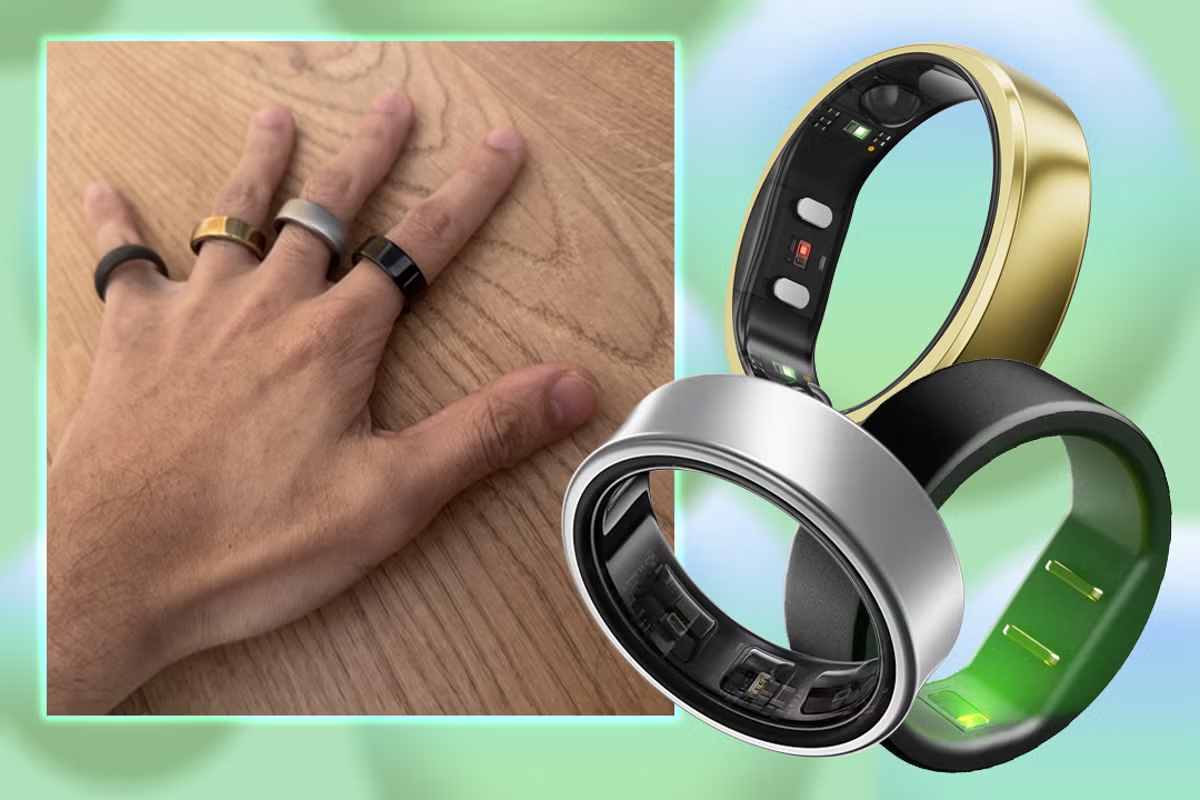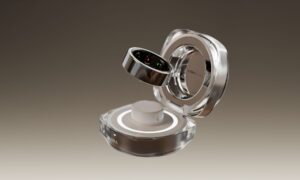Smart rings finally graduated from niche gadget to mainstream wearable in 2025. They’re discreet, screen-free, and sleep friendly, yet powerful enough to surface readiness, recovery, and stress trends that wrist wearables sometimes miss. If you’re hunting for the best smart ring in 2025, this head-to-head will help you pick the right one for your phone, budget, and goals.
Below, we compare the five standouts you’ll see most often: Oura Ring 4, Samsung Galaxy Ring, Amazfit Helio Ring, RingConn Gen 2, and the Evie Ring. (We’ll also touch on Circular’s Ring Slim briefly.)
The contenders at a glance
Oura Ring 4 — best overall insights
Oura’s fourth-gen model brings a new all-titanium design and “Smart Sensing” upgrades that boost sensor accuracy and comfort. The app remains class-leading for readiness and sleep trends, though you’ll pay a $5.99/month membership.
Samsung Galaxy Ring — best for Samsung phone owners
Samsung’s debut ring integrates tightly with Galaxy phones and the Samsung Health app, ships with a handy charging case, and avoids subscriptions. It’s Android-only, and some advanced AI insights are Galaxy-exclusive. Expect ~6–7 days of battery in real-world use. MSRP $399.99.
Amazfit Helio Ring — best value
Now permanently $199 with no subscription fees, Helio is the budget choice for sleep-first tracking. Trade-offs: fewer sizes, limited workout modes, and shorter battery life (often ~3–4 days).
RingConn Gen 2 — best battery & travel companion
A pocket charging case can stretch off-grid time to ~150 days; the ring itself often lasts ~10–12 days. No subscription, strong sleep tracking, but fitness modes and polish still trail Oura/Samsung.
Evie Ring — best for women’s health (iOS-only)
Designed specifically for women, Evie emphasizes cycle and symptom tracking and charges no subscription. Caveats: iOS-only, shorter battery life, and an app experience still maturing. $269.
(What about Circular Ring Slim? It’s ultra-slender and subscription-free, but reviews flag buggy software and modest battery life—fine for tinkerers, not our top pick right now.)
Deep dive: strengths, drawbacks, and who should buy
Oura Ring 4
Why it stands out: Oura has the most refined sleep and readiness analytics, now paired with Smart Sensing that adapts to your finger for better signal quality. The redesigned app (also updated for older models) streamlines daily cards and long-term trends. Hardware is lighter with recessed sensors for all-day comfort.
Reality check: Membership remains $5.99/month after the first month—budget for it. Pricing starts around $349 depending on finish. Battery typically lands around 6–8 days in reviews.
Best for: Anyone who prioritizes proven accuracy, deep sleep insights, and cross-platform support (iOS and Android), and who doesn’t mind a subscription. This is our overall benchmark for the best smart ring in 2025 because its data quality and app polish remain a notch above.
Samsung Galaxy Ring
Why it stands out: No monthly fees, excellent integration with Galaxy phones and watches, and a clever case that carries extra charges. Reviewers praise comfort and the seamless Samsung Health experience. Typical battery life is about a week.
Reality check: It’s Android-only, with certain AI-powered insights (like Energy Score nuances) reserved for Galaxy devices; some early reviews noted uneven battery and tracking at launch. MSRP is $399.99.
Best for: Galaxy phone owners who want a subscription-free, set-and-forget ring with strong sleep tracking and simple wellness guidance. If you’re on iPhone, skip—it won’t work.
Amazfit Helio Ring
Why it stands out: The most affordable mainstream ring by far at a permanent $199, and Amazfit scrapped paid subscriptions—Zepp services are now free for Helio owners. It syncs with Zepp, Apple Health, and Google Fit and keeps core wellness tracking straightforward.
Reality check: Reviews point to limited size options, a small set of workout modes, and battery life closer to three or four days in practice. If you want advanced fitness coaching or long stretches off the charger, look elsewhere.
Best for: Budget-minded buyers focused on sleep, recovery, and basic daily activity without ongoing fees.
RingConn Gen 2
Why it stands out: Battery life is the headline—~10–12 days per charge, plus a pocketable case that can keep you topped up for roughly 150 days without plugging in. No subscription and an aggressive update cadence. Sleep and even sleep-apnea screening are strong for the price.
Reality check: Fitness modes are limited versus Oura or a smartwatch, and some reviewers still note polish/accuracy quirks. Pricing varies by region but is generally lower than Oura.
Best for: Travelers, outdoorsy users, and anyone who hates charging. If you mostly care about sleep and daily vitals—not detailed workout tracking—this is a compelling pick.
Evie Ring
Why it stands out: Purpose-built for women’s health with symptom journaling and cycle insights, subscription-free pricing ($269), and a comfortable, jewelry-like design. Movano also secured FDA 510(k) clearance for the pulse-ox in its B2B EvieMED line, underscoring a health-first roadmap.
Reality check: The consumer Evie Ring app experience is still evolving; battery life is shorter than rivals, and it’s iOS-only for now. If you need broad platform compatibility or marathon battery, this isn’t it.
Best for: iPhone users who want a women-focused ring without monthly fees and can live with a few first-gen rough edges.
Subscriptions, compatibility, and battery: the decision trifecta
Fees:
- Oura Ring 4 requires a $5.99/month membership to unlock full insights; factor that into total cost over time.
- Samsung, Amazfit Helio, RingConn, and Evie currently charge no app subscription fees. (Amazfit made its Zepp services free for Helio owners in a 2024 update.)
Compatibility:
- Oura works on iOS and Android.
- Samsung Galaxy Ring is Android-only, with some features limited to Samsung phones.
- Amazfit Helio syncs with Zepp and can share to Apple Health/Google Fit.
- RingConn supports both major platforms via its own app.
- Evie is iOS-only.
Battery (typical real-world):
- Oura Ring 4: roughly 6–8 days.
- Samsung Galaxy Ring: about 6–7 days, plus a case that provides extra charges.
- Amazfit Helio: ~3–4 days.
- RingConn Gen 2: ~10–12 days, plus a case that stretches total autonomy to ~150 days.
- Evie: shorter than most (around a few days).
Our verdicts (by persona)
- Best overall: Oura Ring 4
If you want the richest long-term health picture with excellent sleep and readiness insights on any phone, Oura 4 still wears the crown. It’s the most likely answer to “what’s the best smart ring in 2025?” so long as you accept the monthly membership. - Best for Samsung users: Samsung Galaxy Ring
Seamless with Galaxy devices, solid sleep analysis, no subscription, and a travel-friendly case. Just remember it’s Android-only and most magical inside Samsung’s ecosystem. - Best value: Amazfit Helio Ring
At $199 with free Zepp services, Helio delivers meaningful sleep/wellness data for half the price of many rivals. Battery life and sizing options are the trade-offs. - Best for battery + off-grid: RingConn Gen 2
Nothing else goes this long between wall charges thanks to its 150-day case. A great “set it and forget it” ring if you don’t need advanced workout tracking. - Best for women’s health on iPhone: Evie Ring
Thoughtful design and no fees; buy if you want cycle-centric tracking and can tolerate a younger app.
Buying tips before you click “add to cart”
- Match your phone. Platform lock-in matters more with rings than watches. If you’re on iPhone, skip the Galaxy Ring; if you’re on Android, all but Evie are viable—but Galaxy works best on Samsung phones.
- Budget for the real cost. Over two years, Oura’s membership adds ~$144; subscription-free rings may be cheaper long-term even if hardware costs more up front.
- Size carefully. Most brands ship a sizing kit first (or strongly recommend one) to avoid returns and sensor slippage.
- Know your priority. If sleep and readiness are #1, Oura and Samsung lead. For value, Helio. For battery endurance, RingConn. For women-focused features on iOS, Evie.
Bottom line
If you want the most complete experience across accuracy, insights, and app polish, Oura Ring 4 remains the overall winner. Samsung Galaxy Ring is the top choice for Galaxy owners who refuse subscriptions. On a tight budget? Amazfit Helio Ring is a surprisingly capable $199 sleeper hit. Road warriors should eye RingConn Gen 2 for its marathon battery, while iPhone users seeking cycle-aware tracking may prefer Evie.
With those trade-offs in mind, you’ll land the best smart ring in 2025 for your life—not just the Internet’s.



































